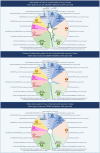Analysis of the mental health service provision in Qatar: Progressing in community mental health in a Middle East country
- PMID: 36590608
- PMCID: PMC9800284
- DOI: 10.3389/fpsyt.2022.1095788
Analysis of the mental health service provision in Qatar: Progressing in community mental health in a Middle East country
Abstract
Background: Qatari health planning in the last decade aimed to make the transition from the traditional hospital-based psychiatric care to a community-based care, building an integrated and comprehensive mental health system. The objective of this study was to explore the mental health service provision in Qatar in 2018 and 2022. This time span coincided with two mental health plans (2013-2018 and 2019-2022) and one health plan (2018-2022).
Methods: This study followed a healthcare ecosystem approach, including context analysis and the standard description and classification of mental health services. Service provision was studied applying DESDE-LTC system (Description and Evaluation of Services and DirectoriEs-Long Term Care), an internationally validated methodology to assess and describe mental health services. Service data were analyzed along with sociodemographic indicators from public statistics to know the care context.
Results: The availability of specialized mental health services increased for adults, although it remained the same for other age groups. The diversity of care and the weight of health-related care over social-related care also remained quite similar. It was noteworthy the development of new services for young adults, migrant workers, and female populations.
Conclusion: This was the first time that this service research methodology has been applied in a Middle East country to study its mental healthcare pattern. The analysis of the mental healthcare pattern in the study time period showed the continued progress toward community-based care in Qatar in the framework of three health plans and despite the unexpected COVID-19 world pandemic.
Keywords: DESDE-LTC; Qatar; health planning; healthcare ecosystem; integrated Atlas; mental health service.
Copyright © 2022 Salinas-Perez, Ghuloum, Gutierrez-Colosia, Bagheri and Salvador-Carulla.
Conflict of interest statement
SG was employed by Hamad Medical Corporation. The remaining authors declare that the research was conducted in the absence of any commercial or financial relationships that could be construed as a potential conflict of interest.
Figures
References
-
- General Secretariat of the Supreme Council of Health. Qatar National Mental Health Strategy, Changing Minds, Changing Lives 2013–2018. Manama: General Secretariat of the Supreme Council of Health; (2013).
-
- Ministry of Public Health of Qatar. Summary National Mental Health Framework 2019-2022. (2021). Available online at: https://www.moph.gov.qa/english/strategies/Supporting-Strategies-and-Fra... (accessed September 30, 2022).
-
- Ministry of Public Health and State of Qatar. National Health Strategy 2018-2022. Our Health, Our Future. Doha: Ministry of Public Health and State of Qatar; (2018). p. 1–56.
-
- ALMEEZAN and Qatar Legal Portal. Law No. 16 of 2016 on Rights of Patients with Mental Illness. Doha: ALMEEZAN and Qatar Legal Portal; (2016).
-
- Solaiman B, Ghuloum S. Towards community care: Qatar’s rapidly evolving mental health landscape. BJPsych Int. (2022) 19:15–18. 10.1192/bji.2021.21 - DOI
LinkOut - more resources
Full Text Sources


